Photographs: Reuters Abhishek Mande and Suparn Verma in Jaipur
After five days of cultural jamboree curtains drew on the Jaipur Literature Festival and writer-director Suparn Verma and Rediff.com correspondent Abhishek Mande witnessed all the extravaganza. From revisiting the '70s to an intense India-Pak debate, Day 5 was packed with action. And here's all.
Suparn says:
The alarm went off at 8 am sharp. As a ritual I woke up Mande first so that I would get 30 more minutes to catch upon my sleep whle he got dressed.
Mande and I had decided to have breakfast at the Diggi Palace, and by the time we reached they were approaching their 10 am deadline to shut down, so one serving and it was all gone.
It was a cold windy morning, the crowds had dwindled from the weekend numbers and the day moved along slowly.
The morning session began with The Reluctant Fundamentalist author Mohsin Hamid who spoke about his experience of writing the book and how the first draft was ready before 9/11.
It started off as a slow session but ended with an interesting round of Q&As.
The other session that was a slow starter as well was the one with Martin Amis and Jay McInerney, which took off with a discussion about writing, but once sex, drugs and Rock 'n Rll in the '70s and '80s entered the conversation there was no looking back.
Amis was asked about pornography, he said that only four per cent women enjoy it, ten per cent don't mind and 85 per cent absolutely loathe it.
'Never found more freedom in China than now'
Image: Kamila And Muneeza ShamsiePhotographs: Suparn Verma
Abhishek says:
Meanwhile I was at a session on China that featured two Western experts on the country -- Isabel Hilton and Stephen McCarty and Chinese author Hong Ying.
Hilton spoke extensively about the impact of China and its policies on the eco-system of the world and suggested that while the larger onus of responsibility lay on the Western nations, countries such as India and China must also commit to reducing their carbon footprints.
Hong Ying who writes about the lives of marginalised groups in China also spoke quite a bit about her experiences as a writer in the country.
Later, we met for a separate interview where she took me by complete surprise by telling me that she has never found more freedom in China than she does now. Ying also spoke about her idea of an independent Tibet and what Chinese think of Indians.
Smack in the middle of this intense discussion, Suparn calls. Apparently we needed two laptops for the chat with Kamila and Muneeza Shamsie.
Suparn says:
At one, Muneeza Shamsie and her daughter Kamila appeared on the Rediff chat. I showed Kamila Mande's column that displayed his puppy love for her.
It's in India's best interest to stabilise Pak: Ahmed Rashid
Image: Author Ahmed RashidPhotographs: Suparn Verma
After this encounter and some rather uninspiring lunch, I discovered that we were just in time for a press conference with Ahmed Rashid, the Pakistani journalist and an expert on Afghanistan, Pakistan and Central Asia.
Earlier, Rashid had a vibrant session chaired by Darlymple as he talked about the Taliban and how Pakistan is trying to fight it. It was followed by an intense Q&A session where everyone picked a side.
The one thing that Rashid kept underlining was that if Pakistan went down the tube, India would suffer the most and that it was in India's self interest to stabilise Pakistan.
Later as he addressed a select group of journalists Rashid spoke about the need for transparency between India and Pakistan over Afghanistan, India's domestic problems as well as what the future holds for the subcontinent.
When Vikram Seth stole the show
Image: Author Vikram SethPhotographs: Suparn Verma
Suparn says:
The session that was the highlight of the day was with author and poet Vikram Seth.
The front lawns were spilling with people of all age groups as Seth took to the stage, making a special mention of drinking coke from his glass, in light of last years' drinking-wine-on-stage controversy.
He spoke about the sequel to A Suitable Boy, which is in the works called...but naturally A Suitable Girl, though he did debate calling her a woman given the day and age we live in.
He also read out his new poems, talked about spending six months in Venice learning to blow glass and then went back to reading poems at times on request.
He was an consummate artist who loves every single moment of his life and work, gets distracted very easily, loves talking with candour when he opens.
In fact my reason for reading Seth from now on would be him as a person first, his art second.
Curtains down on the Lit Fest
Image: Sanjoy Roy Aruna Roy and Tarun Tejpal discuss the RTI actPhotographs: Suparn Verma
As curtains closed on the evening writers Namita Gokhale and William Darlymple and Sanjoy Roy, the producer of JLF, thanked all for making the event such a success.
In response came a tumultuous applause for the dedication that these men and women have shown to being art and art lovers from across the world under one roof for five days.
As they say, it happens only in India!

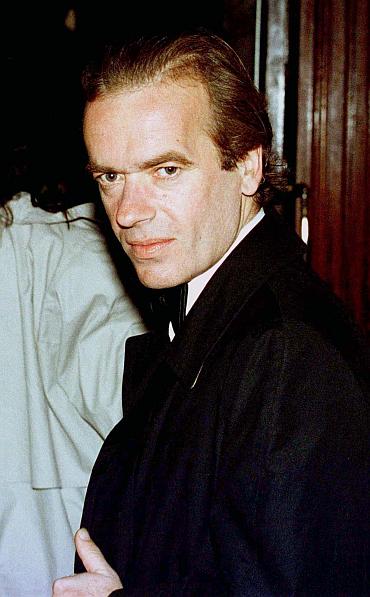
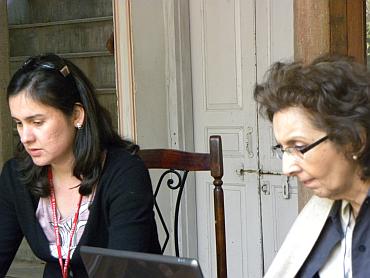
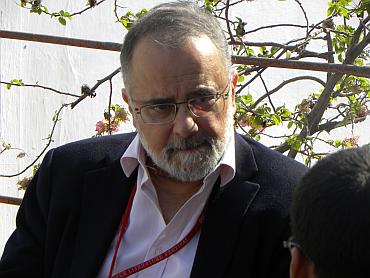
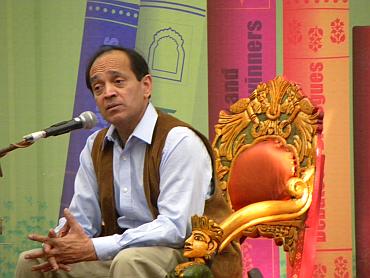
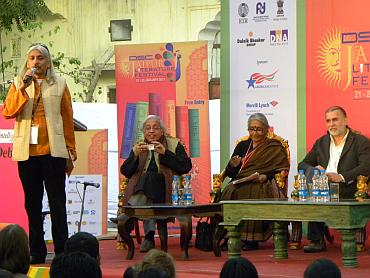
article